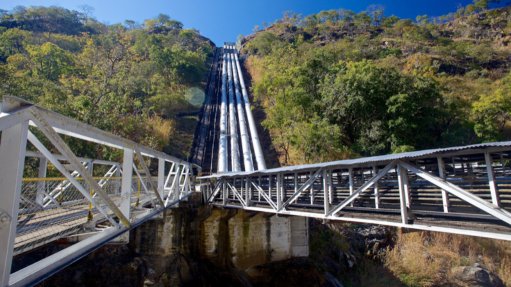Swelling words of emptiness
As South Africans, we tend to think that we have an intimate understanding of South Africa and how it operates. If this line of thinking is true, then our parents should be open books to us, but alas, even they are strangers too. All this is reminiscent of the French novelist Andre Malraux, who wrote: “Man is not what he thinks he is; man is what he hides.”
This begs the question: Is South Africa indeed an open book to all those that observe it? Are international organisations able to gain more of an insight into South Africa than South Africans themselves?
On July 31, the Organisation for Economic Cooperation and Development (OECD), founded in 1961 to stimulate economic progress and world trade, released its ‘Economic Survey of South Africa’. But the OECD actually dates back to April 16, 1948, when it was founded as the Organisation for European Economic Cooperation. You may recall that the Bretton Woods trilogy also dates back to the 1940s: the World Bank was established in July 1944, the International Monetary Fund on December 27, 1945, and, while the World Trade Organisation came into being only on January 1, 1995, its origins can be traced to the International Trade Organisation, which was under discussion from 1945 to 1948.
On its webpage, under the section ‘A mutually beneficial relationship’, the OECD states: “South Africa is Africa’s largest economy and usually is the ‘prime mover’ for OECD activities supporting the objectives of Nepad (New Partnership for Africa’s Development), especially in Southern Africa, on taxation, investment, competition policy and governance. As the OECD and South Africa deepen their collaboration, South African policymakers gain access to OECD expertise and good policy practices; the OECD, in turn, benefits from exposure to South African policy perspectives, to enhance mutual learning.”
Whether South Africa is still the ‘prime mover’ for OECD activities supporting the objectives of Nepad is a question for another day.
Returning to the OECD survey of South Africa, its key messages are to improve the quality of public healthcare and broaden access to private healthcare services; restore fiscal sustainability; implement structural policy reforms to boost competition, restructure State-owned enterprises (SOEs) and develop infrastructure; and support and lift barriers in the tourism industry.
Interestingly, the OECD survey starts by saying that, owing to the lockdown, “growth has collapsed, unemployment is rising and more will need to be done to strengthen responses to the crisis and ensure that the recovery brings about sustainable and more inclusive development”. But, the ‘crisis’ is not a result of the Covid-19 pandemic.
The OECD survey recommends “a wide range of measures to improve the quality of and access to healthcare and support businesses and people”. It adds: “This includes lowering interest rates; providing temporary financial support to households and businesses; and extending financial relief in sectors hard hit by the crisis, particularly if there is a renewed virus outbreak later in the year. Macroeconomic and structural policies are needed to put growth on a sound footing going forward. Bold fiscal measures are needed to curb spending pressures and restore fiscal sustainability, including taking steps to reduce the government wage bill and transfers to SOEs. Structural policy reforms to boost competition, restructure SOEs, improve the regulatory framework and improve public investment in transport infrastructure, skills and education are also called for.”
Anything new or original? The only response to international organisations’ reports on South Africa is that “. . . they speak great swelling words of emptiness . . .” – 2 Peter 2:18.
Article Enquiry
Email Article
Save Article
Feedback
To advertise email advertising@creamermedia.co.za or click here
Press Office
Announcements
What's On
Subscribe to improve your user experience...
Option 1 (equivalent of R125 a month):
Receive a weekly copy of Creamer Media's Engineering News & Mining Weekly magazine
(print copy for those in South Africa and e-magazine for those outside of South Africa)
Receive daily email newsletters
Access to full search results
Access archive of magazine back copies
Access to Projects in Progress
Access to ONE Research Report of your choice in PDF format
Option 2 (equivalent of R375 a month):
All benefits from Option 1
PLUS
Access to Creamer Media's Research Channel Africa for ALL Research Reports, in PDF format, on various industrial and mining sectors
including Electricity; Water; Energy Transition; Hydrogen; Roads, Rail and Ports; Coal; Gold; Platinum; Battery Metals; etc.
Already a subscriber?
Forgotten your password?
Receive weekly copy of Creamer Media's Engineering News & Mining Weekly magazine (print copy for those in South Africa and e-magazine for those outside of South Africa)
➕
Recieve daily email newsletters
➕
Access to full search results
➕
Access archive of magazine back copies
➕
Access to Projects in Progress
➕
Access to ONE Research Report of your choice in PDF format
RESEARCH CHANNEL AFRICA
R4500 (equivalent of R375 a month)
SUBSCRIBEAll benefits from Option 1
➕
Access to Creamer Media's Research Channel Africa for ALL Research Reports on various industrial and mining sectors, in PDF format, including on:
Electricity
➕
Water
➕
Energy Transition
➕
Hydrogen
➕
Roads, Rail and Ports
➕
Coal
➕
Gold
➕
Platinum
➕
Battery Metals
➕
etc.
Receive all benefits from Option 1 or Option 2 delivered to numerous people at your company
➕
Multiple User names and Passwords for simultaneous log-ins
➕
Intranet integration access to all in your organisation

















